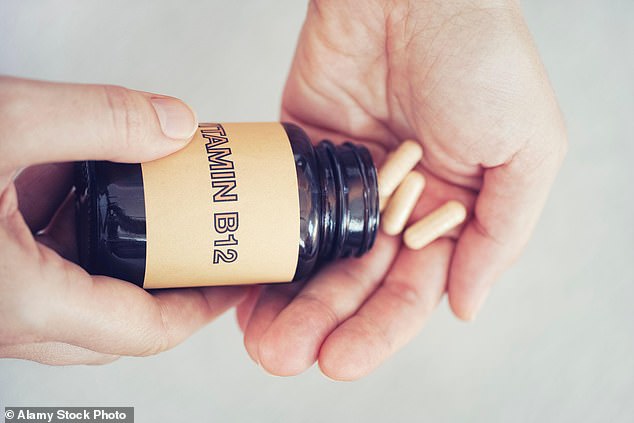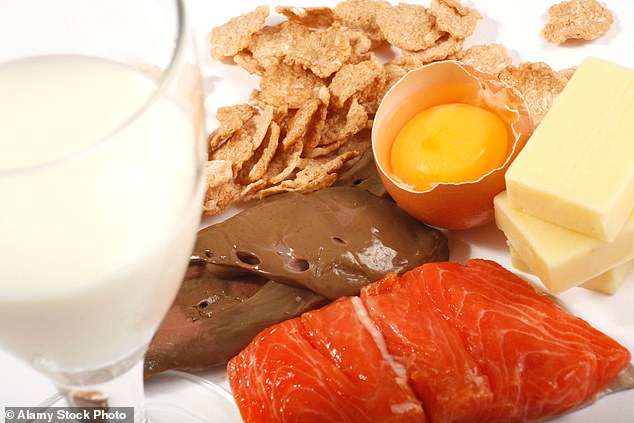My daughter committed suicide because her diet left her deficient in a key vitamin, says surgeon JULIAN OWEN. It’s a hidden epidemic causing serious illness and putting millions at risk
The loss of his 21-year-old daughter Georgina – who committed suicide in 2019 after developing serious mental health problems – was a deeply personal tragedy for orthopaedic surgeon Julian Owen.
But it has also prompted him to campaign tirelessly to alert the public and his fellow doctors to what he sees as a hidden epidemic of serious mental and physical illnesses linked to vitamin B12 deficiency.
Inadequate vitamin B12 can increase the risk of serious cognitive problems such as depression, psychosis and dementia, he says, as well as diseases such as multiple sclerosis and Parkinson’s disease. And the scientific evidence supports him.
Vitamin B12, which helps keep nerve cells and blood in the body healthy, occurs naturally in foods of animal origin, such as meat, eggs and milk, or in fortified products, such as breakfast cereals.
But the growing popularity of plant-based diets means B12 deficiencies may be on the rise.
Georgina Owen, who committed suicide in 2019 after developing serious mental health problems
Current figures show that in the UK at least 3 per cent of 20-39 year-olds – around 4.5 million people – are B12 deficient, according to the National Institute for Health and Care Excellence (NICE). This rises to 6 per cent among the over-60s and more than 20 per cent of the over-85s, according to NICE.
In older people, the problem occurs because the digestive system is less able to absorb the vitamin from food. In younger people, however, the problem is due to nutrition.
Mr Owen, an orthopaedic surgeon at Cambridge University Hospitals Trust, believes that in Georgina’s case it was because she followed a strict vegan diet for more than three years before her death in 2019.
‘Georgina took B12 supplements only sporadically,’ Mr Owen said. ‘Sadly, she became psychotic and committed suicide, suffering from an “acute delusion”.’
A coroner has already heard an expert opinion that a vitamin B12 deficiency ’causes psychiatric symptoms including depression, apathy, irritability, dementia, delirium and hallucinations.’
Although the coroner has not yet made a final ruling on Georgina’s cause of death, her father said: ‘I am convinced that a vitamin B12 deficiency played a part.’

“If you are taking B12 as a supplement, you should take it as a supplement, not as part of a multivitamin,” warns dietitian Helen Bond
Mr Owen said tissue and blood samples taken from Georgina’s organs were still being analysed by experts at the Quadram Institute in Norwich, a centre for nutrition and health research with links to the University of East Anglia and Norfolk and Norwich University Hospitals NHS Trust, to try to establish whether she had a vitamin deficiency.
Georgina had no history of psychotic episodes.
A 2022 report by clinicians from Berkshire Healthcare NHS Foundation Trust and Leicestershire Partnership NHS Trust, in the journal Vitamins & Hormones, warns: ‘Vitamin B12 deficiency can have troubling neuropsychiatric symptoms. It may play a causal role in clinical presentations such as depression, anxiety, psychosis, dementia and delirium.’
The Vegan Society strongly advises vegans to take vitamin B12 supplements or ensure their daily diet includes products fortified with the vitamin, such as breakfast cereals.
It says: ‘If for whatever reason you decide not to use fortified foods or supplements, you must realize that you are conducting a dangerous experiment – an experiment that many have tried before, but with little success.’
According to the NHS, symptoms of such a ‘B12 deficiency anaemia’ can include extreme tiredness and psychological problems that can range from mild depression or anxiety to confusion and dementia.
Mr Owen’s research into the risks of B12 deficiency has alarmed him so much that he has co-founded a group of experts, including hospital doctors and medical academics. This group, called cluB-12, aims to raise awareness of the problem, particularly among doctors, as nutrition is ‘poorly’ treated in most medical training.
He has also co-authored articles in medical journals on B12.
An article published in the BMJ last November explains the vitamin’s role in regulating the nervous system and the development of red blood cells, which is why anemia is a common symptom of deficiency.
The BMJ article also states that B12 enables our cells to produce energy (fatigue is another common symptom of a deficiency), helps protect brain cells, and reduces inflammation in the body.
In another paper, published two years ago in the European Journal of Nutrition, he and his co-authors warned that the cognitive consequences of following a vegetarian or vegan diet without B12 supplements include “depression, memory loss, confusion, psychosis and fatigue – and dyspnea (shortness of breath), while the neurological complications may include loss of sensation, muscle weakness or loss of mental and physical motivation.”
Separately, Mr Owen and his co-authors warned in the journal Anaesthesia last year that nitrous oxide – used in emergency department and dental anaesthesia, as well as a recreational drug called ‘hippie crack’ – can destroy B12 in people’s bodies and attack the enzymes used to convert nutrients into B12. For this reason, they argued, the NHS should phase out the use of nitrous oxide wherever possible and only use it in anaesthesia ‘on a case-by-case basis when there are no alternatives’.
The risk posed by the gas to midwives and nurses last year prompted The Princess Alexandra Hospital in Harlow, Essex, to stop using Entonox (50 per cent nitrous oxide, 50 per cent oxygen) in its maternity unit. At least three other NHS hospitals have also stopped using it.
A major problem with B12 deficiency is that it doesn’t show up with current tests, Owen told Good Health.
‘Some patients with a deficiency will have normal B12 levels in their blood when tested. In most of these cases, the B12 they have in their bloodstream is no longer functioning properly (called a functional deficiency). But the tests can’t pick this up. The current NHS blood test for B12 only picks up about one in three cases of functional deficiency,’ he says.
Commercially available home blood tests that use homocysteine levels as a proxy for B12 levels can also be dangerously inaccurate, he says.
Homocysteine is an amino acid (a building block for proteins). Vitamin B12 breaks down homocysteine in the body. So if a home test for homocysteine shows high levels in the body, it could indicate a B12 deficiency, he argues.
‘There are concerns about the interpretation of homocysteine tests,’ says Mr Owen. ‘When they show a problem, such as a high homocysteine level, it could be due to low levels of a B vitamin other than B12. A poor homocysteine score could also indicate a completely different problem – so improving your homocysteine by taking B12 supplements doesn’t mean you’re going to solve the problem.’
In the BMJ article, published last November, he and his co-author, Bruce Wolffenbuttel, a professor of endocrinology and metabolism at the University of Groningen, wrote: “There is no ‘gold standard’ test to define B12 deficiency.”
Rather than using tests, they advised doctors to examine the full clinical picture and look for “anemia, cognitive problems, insomnia, headaches (especially migraines), mood swings, depression, anxiety, and psychosis.”
Other possible signs of a B12 deficiency include tingling, ringing in the ears, muscle weakness and incontinence, the researchers said.
In severe cases, B12 injections can be more effective than tablets, Mr Owen and Professor Wolffenbuttel wrote. But even with B12 injections, ‘neurological symptoms can take several months or even years to resolve completely’.
According to Helen Bond, a dietitian and spokeswoman for the British Dietetic Association, the NHS recommends that adults need around 1.5 micrograms of vitamin B12 a day. While vegans may not get enough through diet alone, the NHS warns that the rest of us should get enough through sensible, healthy eating.

Sources of vitamin B12 include meat, dairy and fish, which you should be able to get through a balanced diet
‘This is definitely a case of prevention is better than cure with B12,’ she told the Mail. ‘If your diet is reasonably balanced, with a good intake of natural foods such as meat, dairy and fish, you should be able to get your recommended intake of B12.’
“This is definitely a case of prevention is better than cure with B12,” she says. “If your diet is fairly balanced, with plenty of natural foods like meat, dairy and fish, you should be able to meet your recommended intake of B12.”
However, she adds: ‘B12 has come to the fore because it comes from animal products. The rise of plant-based diets has meant that more people are at risk of deficiency if they don’t include bits of meat, dairy and eggs in their daily diets.
‘The risk is particularly high for strict vegans – up to 2 per cent of the population – and vegetarians who avoid eggs and dairy. These people should definitely take a B12 supplement. In addition, it is a good idea to eat Marmite, if you enjoy it, as is eating breakfast cereals fortified with the vitamin.’
Helen Bond adds a very important warning about relying on multivitamins: ‘If you are taking B12 as a supplement, it should be a supplement on its own, rather than in a multivitamin,’ she says. ‘The high doses of chemical vitamin C in multivitamins can actually interfere with your absorption of vitamin B12. It is fine to eat vitamin C in natural foods like fruit.’
Visit www.club-12.org/contributors for more information.
